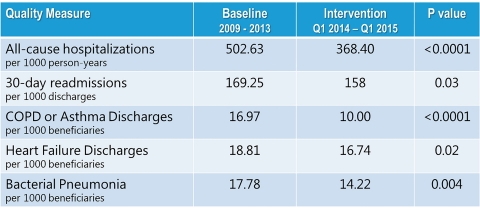STOCKTON, Calif.--(BUSINESS WIRE)--A new study released today reveals medication management educational tools can significantly enhance performance on key Centers for Medicare & Medicaid Services (CMS) measures of quality patient care. Following a seven-month program developed by Prescriber’s Letter drug advisory service, Quality Independent Physicians (QIP) successfully decreased patient hospitalization across all disease states by 26%. It also saw a 24% relative drop in discharges and a 7% relative decrease in 30-day hospital readmissions.
QIP, a 50-physician accountable care organization (ACO), conducted the study. The organization treats 12,000 Medicare patients annually across Kentucky and Indiana. As a Medicare provider, QIP is required by CMS to report on a variety of strictly defined quality measures. Traditionally a fee-for-service industry, healthcare has shifted towards a quality-driven, pay-for-performance model as a result of the Affordable Care Act (ACA).
“As an ACO, our organization is addressing these new challenges and opportunities head on by participating in the Medicare Shared Savings Program (MSSP),” said QIP Medical Director Gregory A. Hood, MD, MACP. “Because key Medicare reimbursements are directly tied to quality metrics and related performance ratings, it is in everyone’s best interest to focus on creating optimal patient outcomes across the entire continuum. As a result, better care as defined by CMS benefits both our patients’ personal health and our practice’s financial health.”
Effective medication management is a major determinant of quality scores. QIP’s partnership with Prescriber’s Letter strengthened its quality metrics through an integrated program of current medication management recommendations delivered at the point of care. It accomplished this by leveraging tools to align medication management enterprise-wide and brought about changes in prescriber behavior, when needed, as well as supported patient education.
“There was a strong belief that a focus on medication management would have the greatest impact on our ability to meet CMS metrics,” said Dr. Hood. “By delivering the latest drug information to the point of care, we were able to align medication management practices and related process throughout the ACO.”
The effort focused on high-risk disease states specifically targeted for CMS reporting or directly related to key quality measures. These included COPD, heart failure, bacterial pneumonia, hypertension, anticoagulation, diabetes and acute coronary syndrome.
Reaching across the continuum, Prescriber’s Letter provided customized, actionable educational resources. These included coverage of target diseases, online searchable medication management recommendations, drug comparison charts, physician training materials, and patient education handouts. All materials were incorporated into QIP standard policies, procedures and organizational culture.
After seven months, metrics during the intervention were compared with a baseline prior to program implementation. “As we hoped, medication management, specifically the Prescriber’s Letter solution, played a pivotal role in changing metrics and patient outcomes,” said Dr. Hood. “We found a statistically significant improvement on all data reported to CMS on MSSP Utilization reports required for an ACO, which yields overall cost savings and higher reimbursements for the organization.”
“The success of the QIP study and the role Prescriber’s Letter in those results underlines our focus on providing unbiased evidence-based information to the healthcare community,” said Wes Crews, Chief Executive Officer of Therapeutic Research Center. “Straightforward, concise information enables health systems and physician groups to streamline distribution across the entire organization, blending our information into clinician workflow. This allows providers, like QIP, to see a change in performance and a change in outcomes.”
About Therapeutic Research Center
Therapeutic Research Center is a leading provider of digital advisory and education information solutions for drug therapy and medication management. In addition to its highly regarded Letters (Pharmacist’s Letter and Prescriber’s Letter), Therapeutic Research Center also provides online resources that expand on their trusted recommendations such as drug comparison charts, patient education handouts, FAQs, and tutorials, as well as a complete continuing education program, online competency and compliance program, a CE & Training Organizer, and learning management portal. TRC also provides a variety of education and advisory services to help technicians including Pharmacy Technician’s Letter and Pharmacy Technicians University, soon to be one of the only online interactive training and certification courses to support the 2020 requirement. Over 400,000 health care professionals rely on TRC’s advisory and education service to give them the practical, unbiased, timely information they need to help improve medication use, prevent medication errors, and improve overall care, quality, and outcomes.




